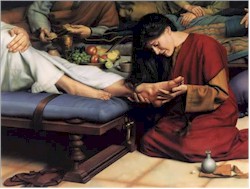 On the other hand, Simon the Pharisee extends the invitation to Jesus for dinner and is pretty proud that his invitation was accepted. Apparently Simon doesn't see himself as a sinner, nor does he acknowledge that, were he a sinner and had faith in Jesus, he too would be forgiven. He sees himself as being part of a different class of people - one who has earned a certain degree of respect and honor.
On the other hand, Simon the Pharisee extends the invitation to Jesus for dinner and is pretty proud that his invitation was accepted. Apparently Simon doesn't see himself as a sinner, nor does he acknowledge that, were he a sinner and had faith in Jesus, he too would be forgiven. He sees himself as being part of a different class of people - one who has earned a certain degree of respect and honor.
There were two sinners before Jesus that day: the woman who had experienced forgiveness and was expressing it - and Simon, who wouldn't admit his need for forgiveness, nor recognize Jesus as the way to be forgiven.
Today's Gospel shows us that the issue isn't about proving our love for God by doing heroic deeds and gaining stature within the faith community. But it is about what Paul says in our Galatians reading. A person "is not justified by works of the law but through faith in Jesus Christ...."
In the Christian life, particularly in the Roman Catholic Church, we tend to stress the hierarchical nature of church structure. Even in our Liturgies, the Eucharistic Prayers order our petitions according to one's place in the mind of the church: we pray first and foremost for the Holy Father, then our local bishop, then all the bishops, priests and religious. Almost as an afterthought we remember "...and all your church whose faith is known to You alone."
We are, of course, praying for ALL members of the family of faith, but our use of language seems to betray a desire to place everything and everyone into neat, little cubbyholes - into their proper positions within the scheme of things. Jesus spent His entire ministry challenging this type of attitude.
Beneath the surface of our lives as Christians, this same challenge is played out again and again. We are always tested as a faith community. Jesus asks us to walk in His footsteps, to take our place among those whose lives are not neat, to follow the narrow road, to meet with opposition and misunderstanding - to offer forgiveness and healing when none is expected nor deserved - and, in many ways, to take up our crosses and die with Him.
We should be clear about our identity and our choices. We need to grow constantly in our understanding of Christian discipleship. We need to take ownership of our faith, and become willing and generous followers of our crucified and risen Lord.
We need to understand that discipleship has nothing to do with stature or prestige. These attitudes are born from an elitist perspective of "privilege," and they destroy the Christian spirit of service, expectation and hope.
Our true "privilege" has everything to do with being an active instrument of God in the society in which we live and it extends only so far as our willingness to proclaim that the message is more important than the one who delivers it, understanding that true power rests in humble, generous, repentant and forgiving hearts, and realizing that no matter how far we have come in the Christian life, there are many more miles to travel. Accepting this brings new opportunities for growth and change.
Living as a disciple means continually "starting over." And that is a challenge for both leaders and followers. Every member of the Christian community contributes to the quality of our faith, our worship, our teaching, and our service. In truth, discipleship is participating with Christ in salvation history: we are the instruments through which God's work on earth is accomplished.





